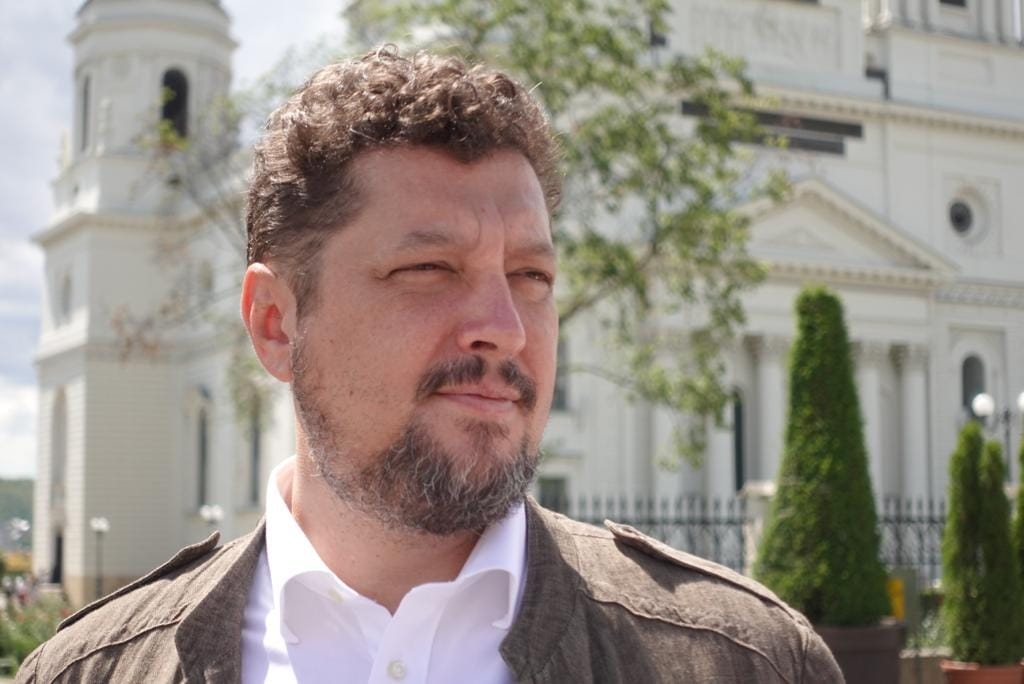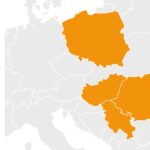Ever since the beginning of the war, the far right has had to appease two constituencies. The more traditional far right had been historically opposed to Russia’s foreign policy: anti-communism and by extension opposition to Russia is the founding myth of the Romanian far-right. This goes way back to Corneliu Zelea Codreanu, leader of the interwar fascist movement The Iron Guard and Ion Antonescu, interwar prime-minister allied with Hitler. The far-right will often justify their deeds (including hate and war crimes) by the need to resist Soviet / Russian influence. Also, the vast majority of Romanians do not sympathise with Russia[1] so every effort to recruit followers from the mainstream needs to account for that.
Another constituency is represented by (ultra)conservatives who would agree with a more robust role for Russia in Europe, if this were to mean weakening the “liberal”, “atheist”, minority-friendlier West. Although still limited in number, the part of the population that openly adhere to such views is represented by a series of notable actors promoting agendas that can be ultra-conservative (such as Teodosie, the Orthodox Archbishop of Tomis[2]), radical populist (like Diana Șoșoacă, a former member of the Alliance for the Unity of Romanians/AUR with open pro-Russian views), or outright opportunistic (like lawyer Gheorghe Piperea[3]). By fusing a pro-Kremlin agenda with a more traditional far-right one, these actors become impossible to ignore and they make their pro-Kremlin agenda also impossible to ignore.
Thus, a tactic used by many far-right politicians and influencers is to focus their discourse in any war-related or Moldova-related discussion on Ukraine, or even better, on possible negative effects of the war in Romania[4]. This allows them to move attention away from sensitive subjects. GlobalFocus Center observed, for example, how Putin’s major speeches are sometimes fully ignored when they are too aggressive to put a positive spin on them[5].
For this report, we have monitored the reaction of far-right pro-Kremlin politicians and influencers to recent developments regarding Moldova, which experiences advanced political instability, amid the direct intervention of a non-state actor synchronized with Russia (fugitive Ilan Sor[6]), economic difficulties and an ongoing energy crisis. We have also analysed the online far-right discussion on the Moldovan breakaway region of Transnistria; on these channels the pro-Russian narrative stuipulating the imminence of a Ukrainian invasion is actively promoted[7].
These events have led to increased interest in the current situation in the Republic of Moldova among the Romanian population and media. But this renewed interest is not fully reflected in the far-right discourse.
There is a lack of synchronicity between the general interest of the population regarding the situation in Moldova, and the way the topic is present within the far-right-leaning online environment. While the topics were not entirely ignored by the Romanian far-right, some of the strongest voices in that ecosystem (including most of the far-right party AUR channels) shied away from commenting. Claudiu Târziu, the former co-president of AUR (less popular than main poster figure George Simion), tried to capitalise on the Transnistria topic by refocusing attention on the party’s stated desire to unify Romania and the Republic of Moldova.
Analysis
In the general online population (see graph below), we noticed an increased interest in issues related to Moldova starting roughly on 10th of February. On 24th of February, the one-year anniversary of the start of the war, interest peaked in both Transnistria and Ukraine. According to Deutsche Welle[8], this comes after three days of Russia trying to scare inhabitants of Transnistria and provoke a migration that would destabilize Moldova. The same day we see a marked increase of interest in issues related to Ukraine (but, interestingly, not to Moldova).

Among the main voices of the Facebook far-right there is marked silence. For our reference month (January 13th – February 13th), important leaders like George Simion (co-president of far-right AUR), Diana Șoșoacă (ultranationalist, openly pro-Russian MP) or Luis Lazarus (far-right journalist) do not speak about the subject in any impactful way..
Claudiu Târziu issued on February 22nd a boilerplate declaration saying that in the current context Moldova and Romania should launch unification negotiations.
Liviu Plesoianu, former Social-Democrat MP and promoter of conspiracy theories like “the great reset”[10] has a fear-mongering post[11] on the 24th of February in which he claims that a world war could be started in Transnistria. The post has moderate success, with an engagement of little more than 4,000.
Two days later, Claudiu Târziu argues, somewhat convolutedly, that “no authority in Chisinau has claimed, nor does it claim that the Russian Federation has ceased to recognize the sovereignty, integrity and neutrality status of the Republic of Moldova” and that “hot-heads” should stop pushing Romania into war[12]. These claims were made even while the Russian Federation was effectively negating Moldova’s sovereignty by having troops on its territory and supporting the illegal authorities in Transnistria.
The choice of Mr Târziu as the voice of the party on the issue is relevant. Within AUR, Mr Simion tries to maintain some kind of balance between pro- and anti- Kremlin forces[13] and this appears to have antagonised Fascist nostalgics represented by Mr Târziu. Choosing Claudiu Târziu to speak on issues related to Moldova guarantees not only a lower profile for the party position on an issue they would prefer to avoid altogether[14] but also that the message is correctly targeted towards those who might not tolerate extended silence.
The absence of high-profile voices from the discussion led to low engagement in the far-right ecosystem. While public interest on the Republic of Moldova had reached a high point since the beginning of February (see Google Trends graph above) the interest in the far-right ecosystem, measured as engagements, peaked briefly on February 24th at 7,000 interactions, but has been generally low otherwise.
The difference becomes even clearer when we compare the general discussion on Ukraine. On Facebook the discussion about Moldova and Transnistria in the reference period comprises 32,519 posts gathering 1,527,729 engagements while the general discussion about Ukraine in the same period consists of 40,390 gathering 3,218,802 interactions[15]. Thus, a ratio of almost 1:1 for posts and 1:2 for engagements. This is similar to the situation in Google Trends, where the ratio between searches on Moldova and Ukraine is also 1:2 (see Google Trends graph above).
By comparison, in the far-right Facebook ecosystem, monitored by GlobalFocus Center, the issues of Moldova/Transnistria are present in 917 posts gathering 45,430 engagements, while in the same period, for the whole subject of Ukraine 3,561 posts were written, gathering 367,682 engagements. This amounts to a ratio of 1:4 for posts and 1:8 for engagements.
Thus, even though the far-right typically supports the territorial integrity of the Republic of Moldova with the expectation that all of it could become part of Romania in the future, it failed to manifest its support on this occasion. It wrote comparatively less about Moldova and gathered even less traction among its public, due to the absence of George Simion and other major actors from the discussion.
The Romanian-language far-right Telegram channels monitored within the scope of this project are replicating the same picture as the analysis of the other online and social-media platforms: while the far-right media channels (the Telegram channel of activenews.ro being the most active disseminator of disinformation) are reporting on the situation in Moldova, advancing the main pro-Russian narratives (i.e. “President Maia Sandu is working against the interests of the Moldovan population”, “Ukraine is going to invade Transnistria”, “Romania is going take control over Moldova by force”), there are just a few – and rather curated – comments on the side of the main far-right actors on these topics.
In
conclusion, the existing data suggests that far-right actors are less
interested in the issue of Moldova than the general public, but their own
public is even less interested than they are. This
result is specific to the analysed situation and would likely be different if
more prominent far-right actors were involved. However, at the very least, we
can see how the decision to avoid the issue is
accepted by the far-right public on Facebook virtually without any objection.
At the very least, this seems to indicate that the issue of Moldova is used
politically for opportunistic reasons, selectively, only when and if it serves
the interests of the far-right (which otherwise professes its deep
nationalistic attachment to Moldova and unification with Romania). Their public
is likely rather amorphous, eclectic and not much more politically active/
militant than the general average.
This report is part of an international research project financed by USAID, coordinated by the International Republican Institute’s (IRI) Beacon Project on countering Russian Disinformation and Propaganda. The opinions expressed are solely those of the authors and do not reflect those of IRI.
[1] https://www.g4media.ro/sondaj-ires-ce-cred-romanii-la-un-an-de-razboi-in-ucraina-62-isi-doresc-ca-romania-sa-sprijine-ucraina-in-razboi-37-sunt-de-parere-ca-se-va-sfarsi-la-finalul-acestui-an-8-din-10-romani-au-incre.html
[2] https://www.hotnews.ro/stiri-cultura-25356837-arhiepiscopul-tomisului-domnul-putin-nu-este-atat-negru-cum-prezinta-toata-lumea-este-cel-mai-mare-ctitor-sfantul-munte-ierusalim.htm
[3] https://www.activenews.ro/opinii/Gheorghe-Piperea-Hai-sa-vedeti-de-ce-Putin-dictatorul-nebunul-iresponsabilul-criminalul-face-parte-din-joc.-Jocul-de-a-dusmanul-si-salvatorul-mai-precis-172979
[4] https://presshub.ro/manipularile-pro-ruse-care-au-prins-in-romania-ce-frici-sunt-alimentate-intentionat-262850/
[5] Unpublished research
[6] Ilan Șor is indicted in the Republic of Moldova for corruption and has left the country. He leads a pro-Russia party, called the Șor party and that party as organised protests in the capital of Moldova asking that the authorities pay the energy bills of the population for the 2022-2023 winter.
[7] https://www.reuters.com/world/europe/moldova-dismisses-russian-report-ukraine-plot-over-transdniestria-2023-02-23/
[8] https://www.dw.com/ro/de-ce-%C3%AEncearc%C4%83-rusia-s%C4%83-isterizeze-popula%C8%9Bia-din-transnistria/a-64812129
[9] https://trends.google.com/trends/explore?date=2022-12-13%202023-03-13&geo=RO&q=%2Fm%2F0d0kn,%2Fm%2F07t21,%2Fm%2F04w4s,%2Fm%2F02122k&hl=en
[10] https://www.facebook.com/liviuplesoianu.oficial/
[11] https://www.facebook.com/100045217061172/posts/740737877443441
[12] https://www.facebook.com/100077113097685/posts/214077604506008
[13] His initial political positions were for the unification between Romania and the Republic of Moldova. This position is necessarily anti-Kremlin, since Russia sponsors the breakaway region of Transdniestria, which is a major barrier to any re-unification. However, he has welcomed in the party openly pro-Russian voices like Diana Șoșoacă or Călin Georgescu (former bureaucrat specialised in environment issues turned nationalist politician)
[14] Indeed, his post gathers about 1000 reactions.
[15] https://apps.crowdtangle.com/search/1760159?customStartDate=2023-02-13T21:59:59&customEndDate=2023-03-13T15:11:00&platform=facebook&postTypes=&producerTypes=3,1,2&q=%22republica%20Moldova%22%20OR%20%22peste%20prut%22%20OR%20%22fratii%20nostri%22%20OR%20transnistria&sortBy=score&sortOrder=desc&timeframe=custom




